Research
Research
Five Research Thrusts
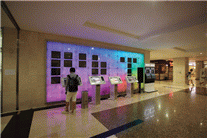
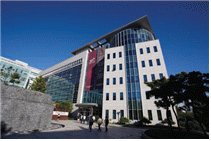
Green Energy & Environmental Engineering
Together with KIST, Korea University (KU) College of Engineering is running a graduate program called “KUKIST Green School” and is doing a research and education on environment, energy technology and policy. Also, in GMRC, a research institute run under government support, KU College of Engineering is conducting a research on harvesting energy from renewable resources, developing new fuel battery systems, and improving natural environment. KU College of Engineering gets the support of over 11 billion won per year for 7 years.
Bio-Medical Engineering
Bio-medical engineering group in KU College of Engineering is in cooperative relations with Korea University Medical Center and KIST. The biomedical engineering covers the basic bioscience that unveils the mechanisms of life to the development of artificial tissues and organs. Also, there are active researches on bioinformatics and genetic manipulation technologies to develop novel functional microorganisms and enzymes.
Nano Fusion Technology
New multi-function Harmonized ceramic / metal / polymer / composite and biomaterials have been developed via Nano technology and interdisciplinary research. On top of this, industry-academic research program has been extensively conducted. KU College of Engineering has research equipments such as TEM, FESEM, SPM, Universal Tester, Thermal camera, Optical profiler, and X-Ray.
Information Technology
KU College of Engineering is conducting various researches through institutes such as electrical energy / communication & networks / signal processing & multimedia / computer engineering / semiconductor & nano / control & robotic systems and Integrated circuit. IT research areas cover techniques for future generation information technology, such as 5th generation (5G) wireless system.
Robotics
The Robotics group in Korea University is working on various robotic applications as well as theoretic researches. A main task of robotic application area is to design field robots in rough terrain, indoor service robots, surgical robots and safe robotic manipulators. Another significant research objective is to develop robotic intelligence, which includes autonomous navigation of wheeled robots, environmental modeling and recognition, machine learning and robot interaction. Also, KASIMOV, Korea University's student club of robotics has won several international prizes.
Customized Industry-Academia Partnership with Companies

Korea University College of Engineering provides students with unprecedented opportunities to have extensive hands-on experience in advance at global companies based on Korea. Korea University College of Engineering opened several departments with the collaboration of companies, to produce experts customized for particular industries in cooperation with business. Students can receive substantial support to get a position or grow as a future global leader, indebted to full scholarships, fellowships, and work practice curriculum directly run by managers and employees at real workplace.
Contract Program
- Department of IT Convergence (with Samsung Electronics)
- Department of Nano Photonics Engineering (with LG Innotek)
- Department of Nano Semiconductor Engineering (with SK Hynix)
- Department of Automotive Convergence (with Hyundai Motor Group)
Korea TechnoComplex
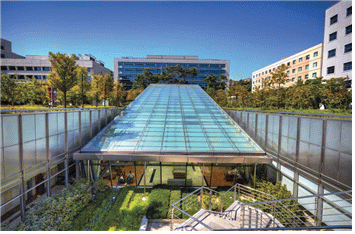
Korea University endeavored to provide the means for promoting collaborative research efforts among academic, industrial and governmental laboratories by establishing the Korea Technocomplex (KTC), the first of its kind in Korea, within its College of Engineering. The KTC is a think tank network that is operated and supported by Korea University for efficient research activities. The KTC aims to optimize practical-based education in engineering and research environment for the development of industrial technologies by promoting collaborative research among academic, industrial and governmental laboratories. By opening their own laboratories in the KTC, companies can perform joint research with faculties and students in the college. KTC is also intended to support technology development for small and medium-sized companies and the start-up of promising ventures. KTC is set to grow into Korea's the largest research organization in the academic and industrial context.
Research Programs Funded by Government-led Projects
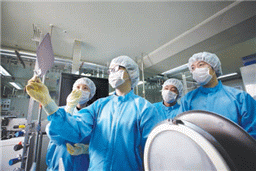
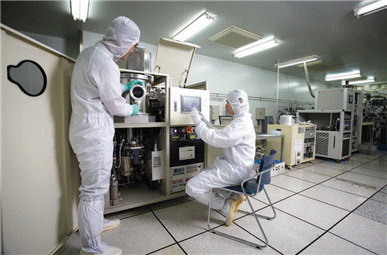
BK21 Plus program is the largest government led project that supports the talented individuals doing master or Ph.D. All 7 departments of Korea University College of Engineering succeeded getting the support of over 11 billion won per year for 7 years from 2013 to 2019. None of competing universities could be selected 100% from the BK21 Plus project except us.
| Department | Program Title |
|---|---|
| Industrial Management Engineering | Big Data in Manufacturing and Logistics Systems |
| Electrical Engineering | BK21 Plus Humanware Information Technology |
| Chemical & Biological Engineering | Innovative Convergence Organization for Chemical Engineering Education |
| Materials Science & Engineering | Center for Creative Materials and Components |
| Mechanical Engineering | Development Group for Creative Research Engineers of Convergence |
| Architecture | Education Program for Urban Regeneration toward Sustainable Communities |
| Civil, Environmental and Architectural Engineering | Innovative Leaders for Creating Future Value in Civil Engineering |


